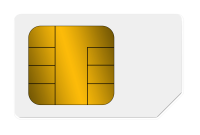
Sim Card
Registration Act
What is the SIM Card Registration Act?
Under the SIM Card Registration Act, Filipinos are required to provide their personal information before buying and activating SIM cards. The act also includes a provision on social media account registration, stating that “all social media account providers shall require the real name and phone number of a user upon creation of account.”
SIM card registration is mandatory in around 90 countries today. In the national context, this has now lapsed into law, derived from Senate Bill (SB) 2395 and House Bill No. 5793, or the proposed SIM Card Registration Act. Its purpose is to curb fraud and other crimes aided by SIM cards. It also includes a provision against online trolls.
Even the lack of empirical evidence, the justification for such a law is law enforcement combating crime and terrorism, at the cost of the individual’s right to data protection and privacy. Despite the widespread opposition from rights groups and privacy advocates, the act “mandating the registration of SIM cards and disclosure of personal information for social media accounts has lapsed into law.” Its purpose is to stop SIM card, internet or electronic communication aided-crimes such as text scams, unsolicited or indecent messages, bank fraud, libel, anonymous online defamation, trolling, hate speech, and the spread of disinformation.
Implementation
How it would work?
The bill mandates public telecommunication entities (PTEs) to require SIM card registration before selling and activating the said SIM cards.
Subscribers will be required to personally submit to PTEs a registration form containing their full name, date of birth, and address. They must also present a valid government ID or similar documents that will verify their identity. Minors, meanwhile, must be accompanied by their parents or guardian during the purchase and registration of SIM cards.
Sellers could refuse the sale of SIM cards if buyers fail to comply with the requirements.
It is stated in the bill that all existing and active subscribers shall register with their PTEs within a year (or half a year, with an extension period no longer than 120 days, based on the bicameral meeting) from its effectivity. Failure to do so within the prescribed period will authorize the PTEs to deactivate the SIM card number.
As introduced by Senate Minority Leader Franklin Drilon, SB 2395, (he introduced the provision in Section 5 of the bill) mandates social media platforms operating in the country to require users to register their real names and phone numbers during registration.
It is likewise the responsibility of the SIM card owner to report its loss or of any change in the information after registration.
The registration required under the measure shall be implemented at no cost to the end-users or the third-party resellers.
Who would impose the law further?
The National Telecommunications Commission, in close consultation with the PTEs, social media providers, the Department of Trade and Industry, DICT, and the National Privacy Commission shall be among the government agencies which shall formulate the necessary guidelines for the proper implementation of the real-name registration program based on the parameters set by the measure.
Penalties from the law
The bill proposes fines or imprisonment for failure to comply with the mandated registration, breach of confidentiality, use of fictitious identities, spoofing, and unauthorized sale of SIM cards.
If caught using fake identities in registering their SIM cards or social media accounts, they would stand to face jail time between 6 months up to 12 years, a fine up to P200,000, or both should SB 2395 become law.
How did it come to be?
- The effort toward the “implementation of a domestic mandatory SIM card registration system” is not a recent event, such an effort has been around since the early 2000s, constantly being opposed by “telecommunication companies, consumer groups, and human rights defenders.” Usually, such proposals of the system are only dramatically revived when an incident related to mobile phones is drawn towards the public narrative.
- “The House of Representatives has approved proposals for a SIM card registration several times in the past and did so again just this previous Congress. It has been the Senate that has adopted a more cautious approach, causing most proposals to meet their demise in this chamber.”
- Senator Vicente Sotto III is a consistent proponent of this SIM card registration act. “The proposal cites pronouncements by the police linking unregistered prepaid phone use to crimes like bombings and kidnapping cases.” The proposal also imposes “a limit on the number of pre-paid SIM cards an individual can register in the system. Any excess will have to be discontinued or transferred to a different owner.” Exemptions make it more difficult to impose such rules. The registered owner must be at least 15 years old.
- Users must present valid identification with a photo to the direct seller of the SIM card, as an additional basis for the bill, proposed by Representative Mariano Michael Velarde Jr. The National Privacy Commission (NPC) will handle registration, the database of subscribers will be maintained by telecommunication companies.
On December 2021, a surge in text message scams supposedly offering jobs and investments has prompted an investigation by the National Privacy Commission. Nearly 700 clients of Banco de Oro (BDO) were also scammed by fraudulent transactions made online. BDO and the Bangko Sentral ng Pilipinas probed into the hacking incident, which caused BDO users to lose thousands in cash. This was one of the justifications for the SIM Card Registration Act.
Digital Rights Issues
- The law requires the use of real names and phone numbers in creating social media accounts. “Fictitious identities” could be penalized with fines or prison time”, thus preventing the citizen’s right to anonymity under the “International Covenant on Civil and Political Rights, to which the Philippines is a party.” “For the LGBTQ+ community, the law essentially forces them to use their “dead names” to avoid imprisonment.”
- “Personal information from SIM card users will be stored on a centralized server… However, cybersecurity experts warn that ensuring the security of a central database “cannot be guaranteed.”
- “The SIM card registry could become a tool for mass surveillance. Any Filipino SIM card user can be the subject of surveillance, potentially endangering whistleblowers and activists. Before the law, human rights defenders have already reported monitoring and surveillance of their online activities by the police. The law, when coupled with other measures that restrict free speech, such as the controversial Anti-Terror Law, “would only legalize invasion and surveillance by the authorities.”
- The law could further acerbate the privacy and safety of activists and civil society groups in the context of the previously established Anti-Terror Law.
The Upsides
- Nigeria – stemming from the belief that unregulated mobile phone use somehow aids crimes such as robberies, kidnappings, and internet banking fraud.
- Ecuador – IMEI (International Mobile Equipment Identity) and SIM registration became mandatory to address handset theft.
- Egypt – “one study claimed to show increased citizen engagement in the elections after a prototype mobile voting system was made possible by the country’s SIM card registration program.”
- Pakistan – the usage of national ID featuring validated biometric data from mobile registration in order to access e-government services.
- Nigeria and Kenya – “the use of registered SIM user data for targeted marketing activities is said to have led to an increase in the take-up of offers among customers.”
THE DOWNSIDES
- Criminals will find ways to circumvent this type of regulation (for example gave rise to the emergence of black markets).
- Identity theft
- SIM cards were traced towards unsuspecting individuals supposedly used by militants in a terrorist attack in Pakistan in 2014.
- Some blamed the system for the rise in handset theft.
- Criminals stealing phones to avoid being tracked.
- The number of devices to be tracked is therefore costly. An example would be the Nigerian Communications Commission (NCC) with the country’s four telecom operators, who spent approximately $128M (Php 6.7 Billion as of March 24, 2022) from 2010 to 2015. Marginalized populations should also be taken into account since they do not have existing valid identification documents.
- Anyone critical of the state, or any marginalized groups would be inspected, and thus, the freedom of expression of information and ideas is repressed or discouraged, along with other fundamental rights.
- For instance, if registration requires a personal appearance for the registrant, those with limited mobility would be negatively affected.
The state must protect the people’s right to privacy, as long as the state’s public safety or national security is checked. When it comes to SIM card registration, the downsides outweigh the upsides, as shown by cases from other countries.


